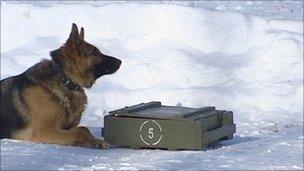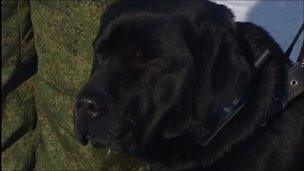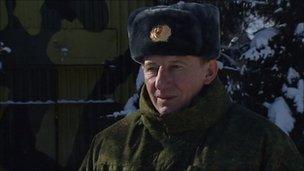Russians train 'hi-tech' bomb-sniffing dogs
- Published

Russia believes troops and the public will be made safer with dogs deployed
At a military base outside Moscow, it is training time for the troops. They are not conscripts, they are canines.
Out on the obstacle course, an Alsatian is clambering over walls, scampering across narrow beams and squeezing his way through tunnels.
Then a group of dogs is given a lesson in how to sniff out explosives which have been hidden in boxes, in cars and in people's pockets.
All the hounds here are training to be sniffer dogs. What makes them different from canine colleagues in other armies is that, as well as having an acute sense of smell, these dogs also have a nose for technology.
I watch as a seven-year-old Labrador called Heinz has a walkie-talkie strapped to his collar.
Communicating with the dog by radio only, a soldier directs Heinz down the road towards a suspicious looking suitcase.
For the purposes of this training exercise, the bag has been packed with explosives.
A few minutes later Heinz reaches the bag and lies down beside it, to indicate he has found a bomb.
Responding to another radioed command, Heinz then returns to base and the offending suitcase is destroyed.
But the dog's work is not done.

Heinz is considered to be the best student at the Russian training centre
Next the soldier attaches a video camera to Heinz.
It sticks up from his collar like a pooch periscope. This time the dog is sent into a building across the field where he uncovers another bomb.
Hi-tech drive
His handler monitors the whole scene in safety on a video screen strapped to his wrist.
The Russian army believes that remote-controlled sniffer dogs will help keep the army and the public safe.
"Dogs can detect the kind of deadly material and explosives that a human being, a robot or a mine detector often struggle to find," says Colonel Vasily Kondratyuk, head of the 66th Military Engineers Corp, where the army's sniffer dog centre is based.
"With their help we can prevent terrorist attacks. Dogs really are man's best friend. Because they save lives."
If the dog is man's best friend, who then is the dog's best friend?
That would be the Russian president.
Following the suicide bombing at Moscow airport in January, Dmitry Medvedev called for more sniffer dogs in Russia. The hounds, he said, were irreplaceable in the war on terror.

Dogs are better than humans and robots, says Col Kondratyuk
That means Russians will soon see more dogs on patrol at airports, train stations and in other public places.
As for Heinz, he is considered to be the best student in the centre.
"He's the most intelligent dog we have here," says Private Sasha, his handler.
"He's kind, obedient and very clever."
After completing their walkies with their walkie-talkies, the barking brigade returns to base and is locked away.
With radios and video cams on their collars these hi-tech sniffer hounds may look unusual - but these days you need to keep up with technology if you want to be top dog in the Russian army.